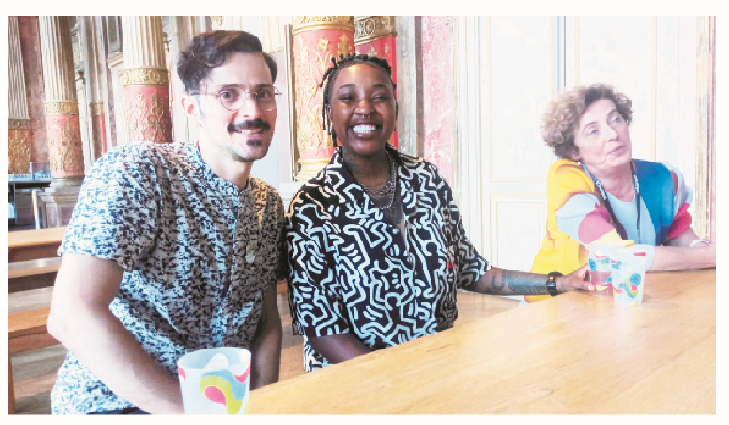Digital Lab Africa (DLA), a rolling project of Tshimologong, South Africa and one of Africa’s largest innovation hub, has in the past few years, ignited and accelerated 48 creative projects in the gaming, animation, XR, music and visual arts, from 17 African countries for greater success.
Via DLA, Tshimologong Innovation Hub helps creatives at the early stages of their career with expertise knowledge and skills they require before taking the huge step into the industry, as well as incubate innovative projects of established creative entrepreneurs for global success.
One of such projects, is that of Nigerian artist and winner of DLA 2022 call, Joseph Osime. Through the project, Osime is currently on all-expenses-paid one man residency programme at Cyclic Voltammetry International School, Paris, France, developing his animation project, where he has access to tools, the expertise of a number of people who are familiar with startups similar to his, and a 100 per cent guaranteed employment opportunity post the incubation.
Tshimologong team, Creative Director, Eduardo Cachucho, Poppy Karabo, and Creative Industry Consultant, Erika Denis of the French Development Agency’s Expertise France, a founding funder of the hub, spoke to LEADERSHIP Newspaper, at the Creation Africa Forum, where it launched the 7th edition of Digital Lab Africa.
According to Karabo, Tshimologong and the DLA was inspired by the absence of creative figures, models and resources that artistes as herself, can reference as examples of who they want to be.
A freelance illustrator, street art, and graphics designer, Karabo nearly gave her parents a heart attack when she decided right after school, to go into business for herself in the ‘unpredictable and unreliable creative industry’. To the typical African parents, the acceptable professions worth doing are medicine, law, engineer, and architecture. The latter the most creative one could get with them.
However, being a creative entrepreneur was her sole means to creating the model, that young creatives can look up to, and emulate in shaping the coming future of Africa’s creative industry.
The turning point came nine years later, in 2018, when her parents could witness the monetary benefits, global prominence and self fulfilment she has from doing what she loved compared to her counterparts in South Africa. She had gained the nicknamed ‘godmother of Digital Lab Africa’.
Through DLA, Tshimologong hosts innovative bootcamp (a series of workshops and masterclasses) where young, budding creatives can acquire skills, learn the processes and ecosystems of creative industry of their choice, which helps reduce risks of starting out ‘green’. Similarly, it opens the call for DLA mentorship and incubation programme dedicated for more experienced digital creatives professionals across Africa.
“Our mission is to get innovative and creative work, at a level of excellence out into the world, especially at an entrepreneurial level. We believe that the world’s appetite for African content, means that it will become a major market for creatives and young people in Africa to have jobs and make a good living for themselves; in addition to building intellectual property that will take Africa forward in the next future,” said Cachucho.
Today, Tshimologong is growing by leaps and bounds, with the expansion of it partners and funders from solely the French Agency for Development (AFD) to Gobelin Animation School, the world’s first animation school, French Animation Festival, and local South African organisations and events like the Animation Film Festival, and Africa Games Week. As it expands, it will require additional partnerships to maintain quality trainings for creatives.
“We have more than 70 partners, if you count funding and expertise but it showing that we are not growing alone. We are growing collectively and within the ecosystems around us.
“The project started with funding from AFD, In total, AFD have invested about €1.4m. What is interesting though is that at the beginning, it was solely AFD funding the programme, but now, AFD funding is about 40 per cent of the space. That means that the 60 per cent additional funding required for the spaces functionality are coming from other partners, especially public entities in South Africa that are beginning to invest in the project. But there is funding support found from friends. As the programme scales up, we are still looking for partners. All of our programmes are free. So, it’s costly, a division we need a lot of funds to host those programmes,” said Denis.
DLA partner, Gobelin offers paid scholarships to 20 students and incubation beneficiaries. “They get stipends and are paid to do the internship for the entire year. and at the end of the programme, there is about 100 percent employment rate. That’s impact. That changing lives. This also means jobs, livelihoods. It is keeping families employed,” said Cachucho
Whilst limited knowledge of the programme in Africa has slowed applicants to the programme, he believes that participating and announcing the 7th edition of DLA will widen its pool of applicants across the continent.
“The most critical thing about an event like Creation Africa, is even like us sitting around the table, that we actually speak in person. is very expensive to bring people together but sometimes the only way, is to put people in a room together, and the way that news travel, and the way that we speak, as humans, its the best way to get information across.
DLA alumnis exhibiting for the first time at the Creation Africa Forum’s Immersive Arts Exhibition include: The Cosmic Egg and Eye of Rre Mutwa by Moratiwa Molema and Shmerah Passchier of the Afrocyborg Collective, Xabiso Vili’s Re/Member Your Descendants, and Sharifa Ali and Yetunde Dada.
We’ve got the edge. Get real-time reports, breaking scoops, and exclusive angles delivered straight to your phone. Don’t settle for stale news. Join LEADERSHIP NEWS on WhatsApp for 24/7 updates →
Join Our WhatsApp Channel










